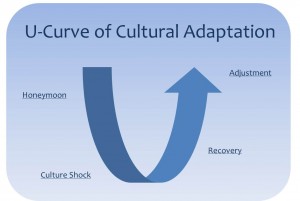During my first year of expatriation in Mexico, I gradually started to feel the urge to find out how adapting to a new culture exactly works. My instincts told me that it was way more complicated than I thought. I knew I had been through several phases but I didn´t really grasp it yet. I had lots of questions and I needed answers.
My search for answers confirmed my presumption. In fact, the more I read about issues such as culture shock, homesickness and the multicultural life in general, the more complicated it got. Reason to worry? I think not. Let’s do this together and have a look at the complex topic of cultural adaptation.
Some say living abroad is a hard concept to understand until you experience it.
I believe even when you experience it, living abroad remains a hard concept.
An Introduction to Cultural Adaptation
There is no generally accepted theory in scientific research, but the stressful period of adjustment in a new culture is typically presented as a U-Curve pattern. The U-Curve is a rather simple reflection of reality, but it gives you a good basic understanding of cultural adaptation or adjustment. It shows 4 psychological stages people go through when moving to a foreign culture:
- Honeymoon
- Culture Shock
- Recovery
- Adjustment
I´ll explain the 4 stages in my own words according to my personal experience:
STAGE #1 – “Honeymoon”
Fascinated by the new culture
You just arrived and there are so many fascinating new things to discover, it´s feels like a holiday or honeymoon as some prefer to call it. The excitement of all the new things can give you a lot of energy and adrenaline; enough to beat or overlook possible problems and disappointment. The possibility to start all over in an unknown place can give a strong feeling of freedom. There are no expectations, no rules, no limitations; everything seems possible. This is the beginning of a dream come true.
Focused on practical arrangements
Besides discovering your new environment you are focused on creating the practical basis of your new existence. You will notice that even the most basic things, such as the installation of gas, water and electricity, can take up a lot of time. Simply because you don´t know yet where to go or maybe because you don´t master the local language yet. In short, not only fun things also practical arrangements have to be newly discovered.
STAGE #2 – Culture Shock
Disillusioned with the new culture
When everything practical has set up and your new life takes form, you must seriously cope with living a new cultural context on a daily basis. You interpret your new life with the taken-for-granted structures, traditions, values and social norms of your home culture. Conflicts and negative consequences of intercultural contact are (in many cases) inevitable upon comparing rules, meanings, and beliefs between the two cultures.
Living in a no-man´s-land
As you discover the cultural differences, you realize you have lost your home and it takes time to build up a new one. You are basically living in a no-man´s-land. The transitional phase of experiencing negative cultural issues and a sense of loss can cause a down period or depression. You may feel anything from disoriented to isolated to vulnerable to lonely to overwhelmed to frustrated or even worse. You are officially culture shocked.
STAGE #3 – Recovery
Learning to understand the new culture
Recovering from culture shock is vital for a successful expatriate experience, but it is also difficult as you cannot force it. Connecting to the place, people and culture has to grow. You are in the process of accepting that things are different from what you are used to. It is important that you develop a new set of assumptions that help to understand and predict the new situations and behaviors. Adapting yourself, your mind and your expectations is the secret; don’t think you will be able to change those around you. Recovering from culture shock means going through ups and downs, often struggling up to a year to reach the next stage.
Developing a new identity
As confusion and uncertainty regarding your role and identity in the new culture raise, you start looking for a balance between your old and new lives. Cross-cultural situations and the emptiness of living in a no-man´s-land invite you to look inside yourself in search for answers on personal questions. It is very common that expats struggle with the foundational questions of identity: Who am I? Who was I? Who will I be? What do I want from life? Where is my home? By contemplating these questions you are filling up the emptiness and building a new sense of identity.
STAGE #4 – Adjustment
Adjusting to the new culture
Congratulations! When you arrive at this point, you have made it through a tough period of life. Recovering from culture shock is a great accomplishment. You understand now that your chosen country is not paradise and that it has its own advantages and disadvantages seen from your point of view. With your freshly obtained cultural skills you can now appreciate your new home. You know that everything will be ok and you can work on living a satisfying and happy expatriate life.
You are a changed woman
The expat life has challenged you and you have experienced that cultural adaptation is not easy at all. It requires character, resilience and openness to the new culture and its customs to beat culture shock. Interaction with the new culture forced you to step back from yourself and become aware of your cultural perceptions. You may or may not adjust completely to the new culture one day; fact is that to some degree you have already become a mediator between two cultures. You are a changed woman.
Those Who Don´t Experience Culture Shock
Although Jan and I come from similar Western European countries, we have had completely different experiences with adjusting to the Mexican lifestyle. Whereas I went through the tough times of culture shock and recovery, he had a significantly smoother adaptation process. Language and cultural awareness are the main reasons for this: Spanish is his second mother tongue and he knows the Latin-American culture well due to his Colombian family from his mother’s side.
Our situation shows that cultural adaptation is an individual process and by no means all expats go through the 4 stages. Personal and cultural factors influence the duration and degree of it. Think of language skills, cultural awareness, amount of contact with locals, emotional stability and your attitude in general. Moreover, non-working globetrotters are generally more affected by culture shock than working ones.
Turning Culture Shock into a Positive Experience
I found life abroad in Mexico more challenging than expected and went through the 4 stages. And I have to say I am glad I did. You may find it surprising to hear that, but I am even thankful I went through the difficult phases of culture shock and recovery. This was a very important period of my life since I learned to develop the necessary mindset to overcome the impact of moving abroad. With much support of Jan, I succeeded the adaptation process by managing myself through change.
I hope being aware of the stages of adaptation will help you to cope with possible down periods while adjusting to life in an unfamiliar culture. Culture shock is in many cases unavoidable and it is by no means a sign that you have made a mistake or that you won´t manage. Living abroad is great, but it does require intercultural flexibility, the willingness to adapt and many other skills unique to expats. The expat life itself provides you the opportunity to make those valuable skills yours. Developing them is essential to integrate but most of all to feel at home.
How did you experience the first year abroad? Do you recognize the stages of honeymoon, culture shock, recovery and adjustment? Please share your experience, ideas and feedback via the comment section below.

